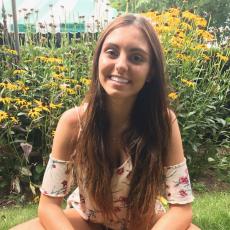
The purpose of this research project is to determine whether eating 8-10 daily servings of fruits and vegetables reduces biomarkers of breast cancer risk in breastfeeding women. The New Moms Wellness Study (NMWS) is a randomized clinical diet intervention trial in which women in the intervention group receive weekly boxes of fruits and vegetables and nutrition counseling. Women enter the study when their infant is 5 weeks old and we collect breastmilk and questionnaire data at 6, 16, 26, and 58 weeks postpartum. Previous studies suggest that increased fruit and vegetable consumption may reduce markers of inflammation, cytokines, and improve DNA methylation profiles in blood. We will compare the levels of inflammatory cytokines and DNA methylation profiles detected in the breastmilk of women in the intervention and control groups. In addition to collecting breastmilk, we are collecting maternal and infant stool samples to determine whether a diet rich in fruits and vegetables alters the gut microbiome of the mother and her breastfeeding infant. One of the most challenging parts of this study is recruiting women to participate. This challenge has been even more difficult during the COVID-19 pandemic. My role in this project was to assist with recruitment.
My internship focused on recruitment for NMWS. I began my internship by meeting with my mentor daily by Zoom to discuss how we could recruit participants while working remotely. Our goal was to recruit 10 eligible women each month. Eligible women must be either pregnant and plan on breastfeeding or have given birth within the previous 5 weeks and are currently breastfeeding. Additionally, women must live within 35 miles of Amherst. My recruitment efforts spanned several areas. I started by helping redesign recruitment materials to reflect changes in the study necessitated by COVID. This included updating brochures, flyers, and a poster to state that the study did not involve face-to-face interviews, and that participants did not need to leave their home as supplies were delivered to their door. I then updated our database to include all towns within 35 miles of Amherst as we recently expanded our study area. After brainstorming about how best to reach participants with our new recruitment material, I created extensive data sheets with contact information of various organizations/establishments/businesses. These groups were all within 35 miles of Amherst and included 1) all newspaper and town newsletters, 2) all religious organizations, 3) all daycares, and 4) all baby stores. For each entity I attempted to include the email, phone number, website and contact name. These extensive lists include hundreds of potential places for advertising our study. I would call and or email each contact on my list. In addition, I contacted local OBGYNs in close proximity to my house in Sixteen Acres, Springfield, had an ad placed on a local TV station, and had an article about my research efforts published in a local newspaper. Finally, I learned to use REDCap (Research Electronic Database Capture) to track my recruitment efforts and those made by my team. In summary, I successfully assisted with recruitment as we are reaching our goal of enrolling 10 participants per month.
Working on this project over the summer has advanced my academic and professional skills. In addition to learning about recruitment and databases, every Thursday we had team meetings during which everyone discussed updates and their efforts on the study. On Tuesdays, I was part of the laboratory team meetings and I learned more about the study and all the “behind the scenes” efforts it takes to run the study. I heard from team members in which they described how they were analyzing the breastmilk our study received. The meetings we had and the amount of people working on the study have significantly improved my communication skills and ability to work in a team. Academically, I have learned a lot in terms of laboratory work. I learned how the samples we received are analyzed, what specific methods and or instruments are used and how the results were interpreted.



An observation I made throughout my summer internship was the difficulty of communication, and especially communication in science. For example, during a newspaper interview I was asked about my status in school. I told them I was a senior at the University of Massachusetts Amherst, but instead, the newspaper wrote that I was a graduate student. Similarly, during interviews I found it difficult to explain the study in simple and clear terms when people asked about the details as to how the study was conducted. Participating in this study made me acutely aware of the need for scientists to communicate to the public in terms that the public understands.